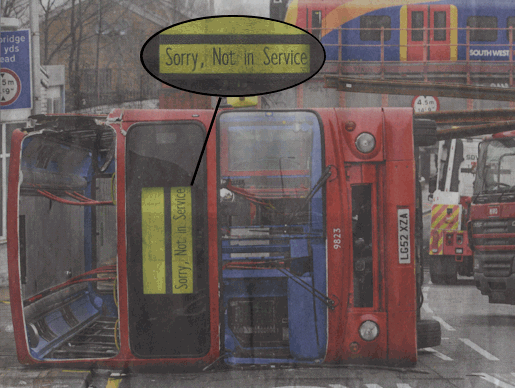Elf and Safety...
One of the joys of living in England is the plentiful opportunities for amusement (and sometimes even amazement) due to the proliferation of daft laws and rules emanating from our near-expired Government. According to an article in last week's newspaper, it's now illegal to sell a grey squirrel. It's nice to know that the appropriate level of law and order is being enforced in these troubled times. But best of all are the ramifications of the "Elf and Safety" laws (as they are affectionally known) that now blight almost every aspect of our lives.
I suppose it's kind of related to the area of computing I moan so vociferously about on regular occasions - protecting people from doing stupid things. I can understand that when I buy a potted plant at a garden centre, the stick that holds it upright has to have a big flat plastic cap on the top so I don't accidently poke my eye out, and I suppose it's logical that a packet of peanuts needs to carry a "May contain nuts" warning.
So it follows that the computer software I use should also protect me from doing stupid things such as forgetting to save the document before closing Microsoft Word, or accidently formatting my system drive. Thankfully, with some very minor exceptions, we don't yet have multiple "Are you really, really sure you want to do this" dialogs. Though I wonder how long it will be before you need to tick a checkbox to agree to some legal contract each time you delete a file, in order to protect the software publisher from being sued for loss of data.
And I see that MSDN is doing their bit to help me avoid installing the wrong version of software, or even following inappropriate advice in TechNet that might not be compatible with my O/S version. Whilst browsing for a fix for a problem on my Windows Server 2008 boxes the other day, I was presented with a big warning sign saying "This article applies to a different version of Windows than the one you are using. Content in this article may not be relevant to you. Please visit the Windows Vista Solution Center" .
Err... thanks. Yes, I do tend to avoid browsing any Web sites from the browser on the server. Especially as I'm usually logged on as an administrator (so I can actually do stuff), and the browser on the server has the Enhanced Security Configuration enabled so almost no Web site actually works anyway. Instead, I use my old non-domain desktop machine (which, perhaps surprisingly, is not running Windows Server 2008?) for general browsing. But I suppose you have to admit that maybe it does prevent some incorrect updates being applied.
I guess the question is: how far should a company or organization have to go to protect people from themselves? Should it be illegal to sell scissors to anyone who doesn't have suitable training in their use and a certificate of proficiency (issued, no doubt, by the Department for Protection from Sharp Kitchen Implements)? Likewise, should computer users be forced to sign a statement absolving the manufacturer of liability before they can edit the Registry. Should there be a law against fiddling with virtual memory settings unless you are a certified engineer (suitably registered on some national database)? Anybody want to take a bet on how long it will be before these actually come to pass?
If you think these are daft rules, how about the one that comes into force next year with regard to tobacco advertising. It will be illegal for cigarette packets and the associated display paraphernalia to carry any advertising at all. Somebody pointed out that the name of the brand is "advertising". I guess it will save the manufacturers money as all brands will be sold in plain white boxes. And, according to the new law, from under the counter. I'll probably have to sneak in to the shop in a large overcoat and dark glasses, and whisper conspiratorially to the shopkeeper. "Pssst... John... quick, gizza packet of the white things... here's a fiver... no questions asked...".
But I suppose what kicked off all of this wild holiday rambling was the following picture I recently came across in the newspaper. Tragically, quite a few passengers were hurt in the accident.

However, what caught my eye and got me wondering was the sign on the front of the bus. I can accept that, on "elf and safety" grounds, they'd need to display the warning that the bus was not in service so that people wouldn't hurt themselves trying to get on it when the door is ten feet off the ground and the seats are ninety degrees out of kilter with their normal position. But the bus was obviously "in service" when the accident happened (unless all the injured people were stowaways). So, who - and at what stage - did they change the sign on the front?
Is there a standing instruction in the London bus driver's handbook that says that the first task in case of accident is to change the sign? Maybe there is a team of London Transport elf and safely inspectors who shadow each bus in case of an accident, and can be on the scene in minutes to change the sign. Or perhaps the Metropolitan Police have a directive that enforces this as the first task when arriving at an omnibus accident. Or could it be that - like modern mobile phones - the buses are equipped with a motion detector that automatically updates the display when it detects more than a pre-specified angle of rotation?